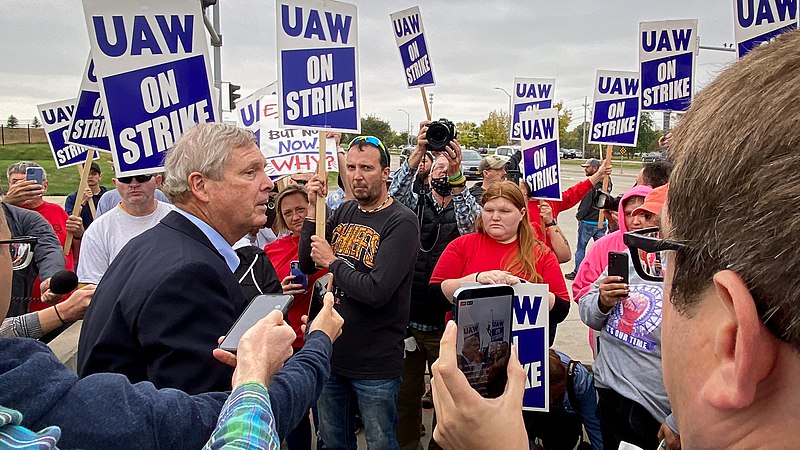Last November, over 10,000 Deer & Co. workers secured a new contract after a monthlong strike, obtaining a 10 percent raise among other concessions. The strike’s success represents a win for workers across the country and could help employees at other organizations pursue similar results by engaging in collective bargaining.
Today, we’re taking a deeper look at the John Deere workers’ strike, what workers at Deere & Co. will get from it, and your right to strike as an employee in California.
What’s the Story Behind the John Deere Workers’ Strike?
The United Auto Workers union represents more than 10,000 Deere & Co. workers across 12 manufacturing plants in Iowa, Illinois, and Kansas. October of 2021 saw the John Deere Workers’ strike begin, with employees picketing outside their workplaces in a bid for immediate raises, as well as increased future pay and benefits.
Deere & Co. made three offers to the union in an attempt to end the strike. The first and second offers were rejected by 90% and 55% of workers, respectively. Sixty-one percent of union members accepted the company’s third offer, ending the strike.
The strike isn’t the only of its kind – UAW-represented employees at a Volvo Trucks Plant in Virginia managed to secure better pay and benefits earlier this year. More recently, Kelloggs announced that the company would attempt to permanently replace 14,000 striking workers after they rejected an offer for a 3% raise – far less than workers bargained for.
Many saw this move as a form of union-busting, and President Biden released a statement condemning the company. On social media platforms such as tik-tok and reddit, various movements have started to flood Kelloggs’ application systems, making it harder for the company to replace striking workers. The negative press and backlash will doubtlessly impact the company, although to what degree remains unknown.
Update: Kelloggs Strike Ends with Victory for Workers
On December 21, 2021, the union representing Kellogs workers in the strike ratified a deal with the company. The deal, which affects 1,400 workers, provided increased wages and benefits to Kellogg’s workers. The deal also requires Kelloggs to:
- Phase out a two-tier benefits system that provided newer workers with fewer benefits than ‘legacy’ employees;
- Offer a path to consistent full-time employment for workers;
- Ensure no plants close through October 2026.
Our striking members at Kellogg’s ready-to-eat cereal production facilities courageously stood their ground and sacrificed so much in order to achieve a fair contract. This agreement makes gains and does not include any concessions.
Anthony Shelton, president of the Bakery, Confectionary, Tabacco Workers and Grain Millers International Union

What Did Workers Get From the John Deere Strike?
The workers were able to secure the following concessions:
- An immediate 10 percent raise;
- Five percent raises after three and five years;
- Three percent lump-sum payments after two, four, and six years;
- An $8,500 ratification bonus;
- Pension options for new employees;
- Earlier health insurance options for new employees;
- Continued no-premium insurance coverages; And
- Adjustments to the productivity-based system Deer & Co. uses to determine bonuses for workers, making it easier for eligible employees to obtain incentive-based pay.
Perhaps most importantly, union-represented workers weren’t the only winners at Deere & Co. The company announced that salaried staff, who were not part of the strike, would also receive an 8% raise.
The press surrounding the strike – and the positive ripple effect on other non-union workers – could further bolster workers across the U.S. to engage in collective bargaining.
Are More Worker Strikes Coming?
It’s possible. In a blog last month, we covered the Great Resignation and why workers are quitting jobs in record numbers. One of our key takeaways? Employees aren’t just seeking better pay – they want employers who give them the quality of life and flexibility they deserve.
Workers have a lot of leverage right now. Although unemployment has continuously fallen, many employers are still desperate for workers, and they’re offering incentives reflective of that desperation.
The success of the John Deere strike and backlash against employers such as Kelloggs that refuse to negotiate could spur other workers to strike for better pay and conditions. At a time when most feel they could find another job if push came to shove, strikes become an increasingly attractive proposition.
Can My Employer Legally Fire Me while On Strike in California?
At this point, you may be wondering whether workers can be fired for striking in California.
Generally, the answer is “no.” The National Labor Relations Act prevents employers from firing striking workers (with exceptions made for some types of workers, such as police and firefighters) for engaging in collective bargaining.
“Experience has proved that protection by law of the right of employees to organize and bargain collectively safeguards commerce from injury, impairment, or interruption, and promotes the flow of commerce by removing certain recognized sources of industrial strife and unrest, by encouraging practices fundamental to the friendly adjustment of industrial disputes arising out of differences as to wages, hours, or other working conditions, and by restoring equality of bargaining power between employers and employees…”
” It is declared to be the policy of the United States to eliminate the causes of certain substantial obstructions to the free flow of commerce and to mitigate and eliminate these obstructions when they have occurred by encouraging the practice and procedure of collective bargaining and by protecting the exercise by workers of full freedom of association, self-organization, and designation of representatives of their choosing, to negotiate the terms and conditions of their employment or other mutual aid or protection.”
National Labor Relations Act
However, there are circumstances where employers can fire striking employees. Employers can fire workers who strike illegally, which happens when:
- A strike becomes violent or destructive;
- The employees have signed a no-strike clause;
- The strike prevents customers or non-striking workers from attending the workplace;
- The demands of the striking employees require the employer to act unethically or unreasonably, such as requesting that they fire all non-union workers.
How Do Companies Prevent Workers from Striking?
While companies can’t fire striking workers, they can hire permanent replacements (which is how Kelloggs is attempting to ‘end’ their strike). At first glance, that may seem indistinguishable from firing striking workers, but there are some important differences.
Employers who try and replace striking employees have a lot to lose. Most strikes make returning workers to their jobs a condition of ending the strike. So, if an employer does negotiate with striking workers after hiring replacements, they end up employing twice as many workers. A costly proposition, to say the least.
They may also struggle to find employees skilled enough to replace striking workers, especially with bad press hounding them. That forces the employer to negotiate – and striking employees often increase their demands if they know they can’t be replaced.
Employers also frequently try to create justifiable reasons to fire striking employees. For example, last year, Amazon employee Chris Smalls led a strike at a facility in Statin Island. Smalls led the strike to demand increased COVID-19 protections for warehouse workers, and Amazon ironically fired him for “violating social distancing guidelines.” Like Kelloggs’ replacement of striking employees, critics said the move was union-busting that relied on a technicality for legality.
If you’ve been wrongfully terminated as a result of a strike, you need a lawyer.
If you engage in collective bargaining and your employer terminates you, contact an employment attorney. They can help you understand whether your employer violated your rights and pursue the compensation you deserve.
By filing a wrongful termination suit, you could receive compensation for:
- Lost wages;
- Pain and suffering caused by losing your job;
- Punitive damages imposed on your employer for committing illegal acts.
A court could also order your employer to reinstate you at your previous position or one effectively similar.
At Wilshire Law Firm, our team is dedicated to ensuring you receive the legal counsel and support you need. Contact us online or give us a call at (800) 501-3011 for help with your case!
For more, read our other articles on our California Employment Law Blog.











